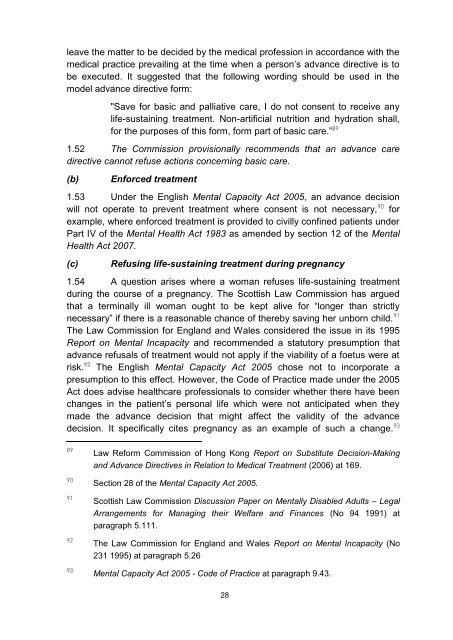Consultation Paper on Bioethics - Law Reform Commission
Consultation Paper on Bioethics - Law Reform Commission
Consultation Paper on Bioethics - Law Reform Commission
Create successful ePaper yourself
Turn your PDF publications into a flip-book with our unique Google optimized e-Paper software.
leave the matter to be decided by the medical professi<strong>on</strong> in accordance with the<br />
medical practice prevailing at the time when a pers<strong>on</strong>‟s advance directive is to<br />
be executed. It suggested that the following wording should be used in the<br />
model advance directive form:<br />
"Save for basic and palliative care, I do not c<strong>on</strong>sent to receive any<br />
life-sustaining treatment. N<strong>on</strong>-artificial nutriti<strong>on</strong> and hydrati<strong>on</strong> shall,<br />
for the purposes of this form, form part of basic care.” 89<br />
1.52 The Commissi<strong>on</strong> provisi<strong>on</strong>ally recommends that an advance care<br />
directive cannot refuse acti<strong>on</strong>s c<strong>on</strong>cerning basic care.<br />
(b) Enforced treatment<br />
1.53 Under the English Mental Capacity Act 2005, an advance decisi<strong>on</strong><br />
will not operate to prevent treatment where c<strong>on</strong>sent is not necessary, 90 for<br />
example, where enforced treatment is provided to civilly c<strong>on</strong>fined patients under<br />
Part IV of the Mental Health Act 1983 as amended by secti<strong>on</strong> 12 of the Mental<br />
Health Act 2007.<br />
(c) Refusing life-sustaining treatment during pregnancy<br />
1.54 A questi<strong>on</strong> arises where a woman refuses life-sustaining treatment<br />
during the course of a pregnancy. The Scottish <strong>Law</strong> Commissi<strong>on</strong> has argued<br />
that a terminally ill woman ought to be kept alive for “l<strong>on</strong>ger than strictly<br />
necessary” if there is a reas<strong>on</strong>able chance of thereby saving her unborn child. 91<br />
The <strong>Law</strong> Commissi<strong>on</strong> for England and Wales c<strong>on</strong>sidered the issue in its 1995<br />
Report <strong>on</strong> Mental Incapacity and recommended a statutory presumpti<strong>on</strong> that<br />
advance refusals of treatment would not apply if the viability of a foetus were at<br />
risk. 92 The English Mental Capacity Act 2005 chose not to incorporate a<br />
presumpti<strong>on</strong> to this effect. However, the Code of Practice made under the 2005<br />
Act does advise healthcare professi<strong>on</strong>als to c<strong>on</strong>sider whether there have been<br />
changes in the patient‟s pers<strong>on</strong>al life which were not anticipated when they<br />
made the advance decisi<strong>on</strong> that might affect the validity of the advance<br />
decisi<strong>on</strong>. It specifically cites pregnancy as an example of such a change. 93<br />
89 <strong>Law</strong> <strong>Reform</strong> Commissi<strong>on</strong> of H<strong>on</strong>g K<strong>on</strong>g Report <strong>on</strong> Substitute Decisi<strong>on</strong>-Making<br />
and Advance Directives in Relati<strong>on</strong> to Medical Treatment (2006) at 169.<br />
90 Secti<strong>on</strong> 28 of the Mental Capacity Act 2005.<br />
91 Scottish <strong>Law</strong> Commissi<strong>on</strong> Discussi<strong>on</strong> <str<strong>on</strong>g>Paper</str<strong>on</strong>g> <strong>on</strong> Mentally Disabled Adults – Legal<br />
Arrangements for Managing their Welfare and Finances (No 94 1991) at<br />
paragraph 5.111.<br />
92 The <strong>Law</strong> Commissi<strong>on</strong> for England and Wales Report <strong>on</strong> Mental Incapacity (No<br />
231 1995) at paragraph 5.26<br />
93 Mental Capacity Act 2005 - Code of Practice at paragraph 9.43.<br />
28

















